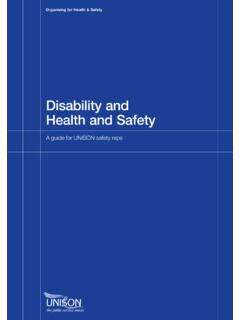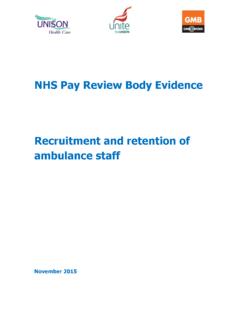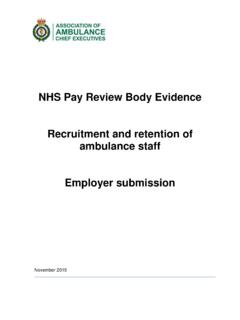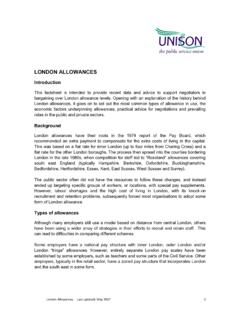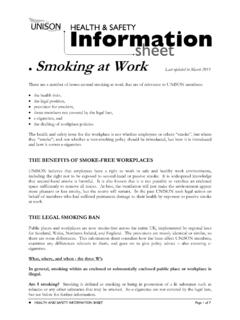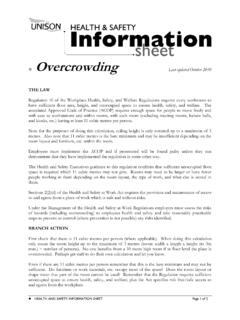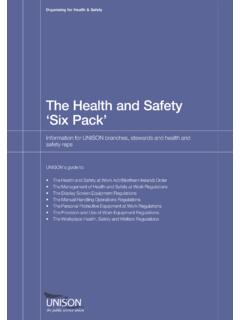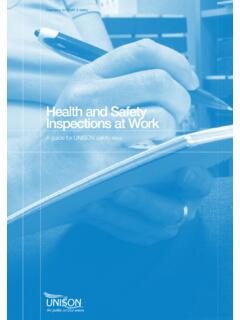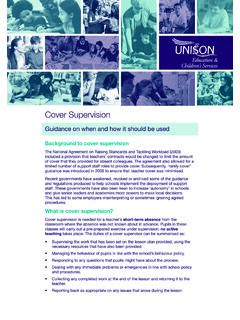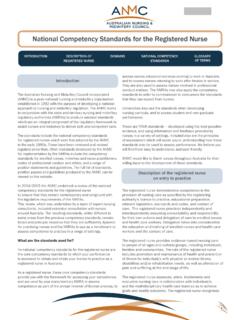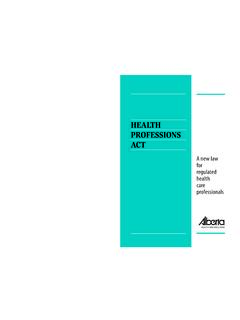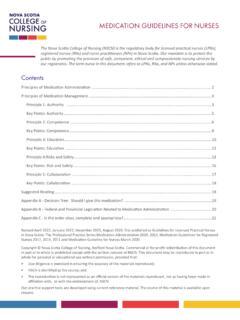Transcription of UNISON duty of care handbook - UNISON National
1 UNISON duty of care handbookFor members working in health and social care At a time of change, patients and service users depend more than ever on the integrity of care professionals. This handbook is a valuable guide to health and care professionals responsibilities and rights, and to sources of help when it may be hard to know the right thing to do and even harder to do it. Safeguarding the public and delivering high quality patient care are essential. Key to this is creating a culture where nurses and midwives are able to appropriately raise concerns, particularly in a time of significant structural change across health care organisations. This handbook is a useful supplement to the Code and other NMC standards and guidance which specify the responsibilities of nurses and midwives in raising and escalating concerns.
2 The Health Professions Council (HPC) is committed to protecting the public and ensuring that professionals are meeting UK standards for their training, professional skills, behaviour and health. UNISON s duty of care handbook provides a useful accompaniment to the HPC s guidance and standards, and assists in maintaining good practice across the health and social care Cayton, chief executive, Council for Healthcare Regulatory ExcellenceProfessor Dickon Weir-Hughes, chief executive and registrar, Nursing and Midwifery CouncilMarc Seale, chief executive and registrar, Health Professions Council UNISON duty of care handbookBy Dave PrentisThe duty of care handbook is intended to assist all those seeking guidance on how best to question and challenge unsafe practice in health and social care settings. Its broad scope means that it is applicable to all occupations across the public, private and voluntary sectors, making it relevant for all those who have concerns and wish to find an effective and responsible way of voicing recent years, there have been high-profile cases which demonstrate how pressures on staff and services can lead to failures in the duty of care including the report into the tragic death of baby Peter as well as the Francis Report which revealed failings in care standards at Mid Staffordshire NHS Foundation of these events have changed the landscape of how we look at the duty of care .
3 They have reminded us of the vital importance of raising concerns and acting on them before it is too late, and of developing a workplace culture which enables staff to have the confidence they need to speak out. There is clear evidence, including recent research conducted by Aston University, which shows that high levels of staff engagement, where staff are encouraged to contribute to decisions that affect them in the workplace, have a positive impact on financial management, health and well-being, quality of service and patient handbook aims to empower UNISON members working in health and social care to have a positive influence and be the guardians of safe, effective and high-quality PrentisForeword3 UNISON duty of care handbook 1 Introduction 2 The duty of care 3 Your duty of care registered professionals Members of professional bodies or associations Managers Students and trainees Trade union representatives 4 When your employer s instructions conflict with your duty of care 5 Statutory rights and duties The public interest whistleblowing Equality legislation Health and safety legislation Working Time Regulations Regulation of health and social care providers Scrutiny bodies The NHS constitution (England only)
4 6 Health and well being at work 7 Using workplace protocols to support the duty of care Best practice guidelines Quality standards Training and supervision Workload management Customer complaints Risk registers Escalation plans Measuring unmet need Positive risk taking and structured judgement 8 Maintaining and supporting the duty of care 9 Challenging unsafe practices the steps to take 10 The duty of care as an organising tool A Case studies workload and staffing B Case studies health and safety C Case studies skills and training .. 5 .. 6 .. 7 .. 8 .. 10 .. 11 .. 11 .. 11 .. 13 .. 14 .. 14 .. 14 .. 15 .. 15 .. 16 .. 16 .. 16 .. 17 ..18 .. 18 .. 18 .. 18 .. 19 .. 19 .. 19 .. 20 .. 20 .. 20 .. 22 .. 24 .. 26 .. 27 .. 33 .. 35 Contents4 UNISON duty of care handbook1 Health and social care staff across the UK are being confronted with changes to services, vacancy freezes, increasing workloads and reductions in staffing and budgets.
5 Occupational boundaries and the way services are being delivered are also changing. With all these pressures on health and social care services there has never been a more important time to ensure that the services you provide are effective and safe. As a health or social care worker you owe a duty of care to your patients/service users, your colleagues, your employer, yourself and the public interest. When there is pressure on staff or services it can impact on your duty of care . For example, if there are excessive workloads, changes to services, inappropriate delegation of tasks or poor health and safety practice. This handbook is intended to assist good practice and improve services by giving guidance on how to tackle concerns about unsafe practice effectively and positively, and in partnership with employers.
6 It will also help you to influence plans to change services or staff roles and enable UNISON members to be guardians of safe, effective duty of care handbookUNISON duty of care handbook2 duty of care is a phrase used to describe the obligations implicit in your role as a health or social care worker. As a health or social care worker you owe a duty of care to your patients/service users, your colleagues, your employer, yourself and the public interest. Everyone has a duty of care it is not something that you can opt out of. The duty of care applies to all staff of all occupations and levels. It applies to those working part time or full time, those in agency or temporary roles as well as students and have a duty of care , whether you are a registered professional or non- registered . It applies to everyone, from nurses to porters, cleaners to receptionists, paramedics to therapists and technicians to social workers.
7 The duty of care to a patient or service user exists from the moment they are accepted for treatment or a task is accepted and they begin to receive services. This may be, for example, on admission to a ward, acceptance onto a caseload or once registered at an accident and emergency department. You have a duty of care to all patients or service users even if you are not directly responsible for their health and social care organisations, whether they are public, private or voluntary organisations, also have a duty of care . Their duty of care is to provide a comprehensive service to citizens and to demonstrate that, within the available resources, the appropriate priorities are chosen. They must also ensure that those people who are providing care are able to do so safely. Just because an employee or employer cannot do everything that they believe needs to be done, does not mean they have breached their duty of care .
8 There are not limitless resources available, therefore the obligation of an employee and employer is to ensure that what is actually done is done safely and in an appropriate and timely manner. They should also make it clear what cannot be duty of care 6 UNISON duty of care handbookUNISON duty of care handbook3 Your duty of care means that you must aim to provide high quality care to the best of your ability and say if there are any reasons why you may be unable to do so. You must adhere to a standard of reasonable care and you are expected to:n keep your knowledge and skills up to daten provide a service of no less a quality than that to be expected based on the skills, responsibilities, and range of activities within your particular trade or professionn be in a position to know what must be done to ensure that the service is provided safelyn keep accurate and contemporaneous records of your workn not delegate work, or accept delegated work, unless it is clear that the person to whom the work is delegated is competent to carry out the work concerned in a safe and appropriately skilled mannern protect confidential information except where the wider duty of care or the public interest might justify disclosureIn addition to these expectations, all employees have obligations and rights arising from their contract of employment.
9 These may be found in various documents. For example:n the statement of terms and conditions of employment which must include details of the salary paid, holiday entitlement, and so onn other documents which are drawn to the attention of the employee such as disciplinary procedures, job descriptions, clinical protocols and standards, work rules (on everything from parking to health and safety)n statutory terms which are assumed to apply to all contracts (eg healthand safety legislation, anti-discrimination legislation, unfair dismissal and redundancy rights, the right to blow the whistle )All contracts of employment also include implied duties . These exist whether or not they are actually written down as part of the contract. They include an obligation for the employee to work in accordance with lawful orders, co-operate with their employer, serve the employer faithfully and honestly and exercise skill and care in the performance of their return, the employer is obliged to pay agreed wages for duties performed or which the employee is ready to perform, provide a safe working environment, act in good faith and behave reasonably towards the employee.
10 It is the responsibility of employers to provide all staff with clear roles and responsibilities, along with the appropriate a practitioner you should not be asked to perform any task which is beyond your level of competence. If you are being asked to take on tasks which you are not properly equipped or trained to do then you should decline to do the task and explain why. If you are under pressure and worried about what will happen if you decline to do a task then you should seek advice from your local trade union rep. The duties and principles outlined above relate to all staff. However, there are certain groups of staff such as registered professionals, members of professional associations, managers, students and trade union representatives who have some unique or additional rights and responsibilities in terms of their duty of care .
